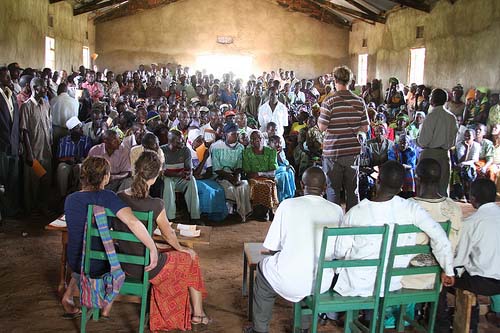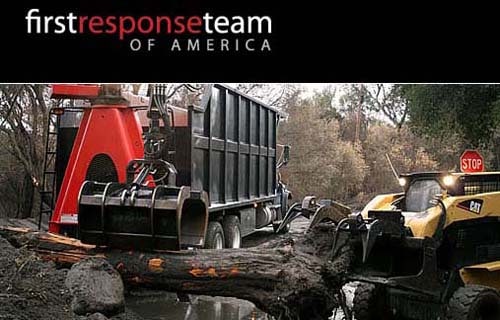Saturday, August 01, 2009
Friday, July 31, 2009
What kind of Difference R U?
Saturday Church begins at 5pm and is a more contemporary music style than the other times and we like that.
We also like the theme of our church that is often talked about in the sermons, equipping people to make a Christ-life difference in the world.
You can ask me why I am a Christian and I'll tell you my story if you wish. And I know that it is never too late for anyone, as my Dad 11 years ago while lying on his death bed prayed with me & his grandchildren for his salvation, wrapping up a discussion that he and I first had 16 years earlier.
This post however is not about being a Christian. A lot of people call themselves Christians but you would never know that by their actions. This post is about making a Difference and it comes from the Art of Manliness Blog:
Posted: 30 Jul 2009 11:03 PM PDT

Civilian Conservation Corps, Oregon
A man walking on the beach saw a child reaching down to pick up small objects and then throwing them into the ocean. He called out “Good morning! May I ask what it is that you are doing?” The child looked up and replied “Throwing starfish into the ocean.”
“I must ask, then, why are you throwing starfish into the ocean?” To this, the child replied, “The sun is up and the tide is going out. If I don’t throw them in, they’ll die.”
Upon hearing this, the man commented, “But do you not realize that there are thousands of starfish? You can’t possibly make a difference!”
At this, the child bent down, picked up a starfish, and threw it into the ocean. As it met the water, he said, “It made a difference for that one.”
Adapted – Loren Eiseley “The Star Thrower”
This article is intended to inspire; because it can seem that the efforts of one are insignificant, that a single man’s actions will not be noticed. But nothing could be further from the truth. Inspired individuals can and do make a difference.
Declaring War on Extreme Poverty – Nuru.com

NURU Training in Kenya - modern farming techniques, water sanitation training, and sustainability are the topics being covered.
I use the term “war” because that is how Jake Harriman has approached his mission of eliminating extreme poverty. A Naval Academy graduate, Jake served as a Special Operations Platoon Commander with 1st Marines and deployed with BLT 3/1 during the initial thrust up from Kuwait to Baghdad. It was in Iraq that he came into contact with people whose economic situation was so desperate that they were being forced into the unthinkable life and death decision of fighting US forces or having their families murdered. After these events he sought to make a difference, to find a way to help his fellow human beings caught in the cycle of extreme poverty.
Leaving the military, Jake pursued his masters at Stanford where he conducted independent research on what worked and what didn’t for non-profits operating in impoverished regions, specifically Africa. Taking what he learned, he founded Nuru International with the goal of helping communities pull themselves out of the clutches of extreme poverty through a sustainable business model that included education and micro loans for better crop inputs. Creating a lean strike force which he would lead, the initial Nuru team was to be the test subject to see if the idea was scalable. Nuru’s first team into Africa included water & sanitation specialist Nicole Scott, marketing specialist Douglas Scott, and health care expert Janine Dzuba. Harnessing their individual strengths along with a grassroots support base, Jake sought to lay the foundation for a concerted and sustained effort to eradicate extreme poverty in Kuria, Kenya.
What has Nuru International accomplished in less than a year? With their modest resources, Jake and his team helped 450 farmers learn modern farming techniques, worked with them to acquire 70 tons of fertilizer, and planted over 7 tons of quality seed. As of April 2009, this has translated into an increased crop yield of over 400% which will enable the farmer to not only feed their families but pay back their loans in addition to having resources left over to repeat the process next year. They also taught thousands proper sanitation techniques (boiling water before use, washing with soap properly, using mosquito nets, etc), spearheaded the building of collecting rain water from roofs, and organized the digging of 4 wells to decrease the need of women to walk miles to fetch water from streams.

NURU Crop Results - The farmer on the left did not participate while the farmer on the right did and experienced a 400% crop yield increase.
This picture, take in July of 2009, shows clearly the difference Nuru made for farmers who took advantage of their training and loans. These two fields were within a stone’s throw of each other – the field on the right yielded more corn in one season than this farmer had seen in the previous five years combined.
Nuru International has permanently improving the lives of 5000 people by providing them the tools to pull themselves out of extreme poverty. And the amazing thing is their model is both sustainable and transferable; already there are plans to expand the program once the proper resources are available. To learn more visit Nuru’s website where you can see their videos summarizing recent accomplishments and become a fan of their Facebook Page where they just posted their latest pictures from Kenya.
Using Your Unique Skill Set – The First Response Team of America

Tad Agoglia and The First Response Team at work clearing debris after a natural disaster strikes a small town.
Growing up in West Texas I remember seeing firsthand how destructive nature could be; in 1987, the town of Saragosa was wiped off the map when a monster tornado ripped through the town. The floods in Iowa last year again highlight to me just how powerful the forces of nature can be. Nothing can be done to avoid a natural disaster – but what can we do to help immediately after the event, in the first few critical days when people need help the most? What can one person do in that critical time period?
Tad Agoglia asked himself that question; a successful small businessman, he owned two specially designed trucks outfitted with debris clearing claw cranes capable of lifting cars. As a contractor he watched government agencies sometimes take weeks to get recovery operations going. Seeing this, Tad felt that America deserved a better type of response to these disasters.
In May 2007, Greensburg, Kansas was destroyed by a tornado. Tad immediately loaded up his equipment and small team of men and drove to the disaster offering his services – free of charge. His team cleared roads for emergency vehicles, opened the fire department and hospitals, recovered valuable equipment and documents covered by debris, and provided power with their industrial strength generators. His work allowed emergency personnel to do their jobs, helping heroes be heroes. Since Greensburg, Tad and his team have responded to over 20 disasters across the United States. Again, all free of charge. I can only imagine what this world would be like with more men like Tad.
To learn more about the First Response Team of America, visit their website and join their Facebook page.
What Can I do Right Now?
We all know that money is something non-profit organizations are always short on, so all I’ll say is make sure your contribution counts. I prefer small, local, and religious organizations that use a volunteer force vs. a well paid staff. These organizations usually do a better job of stretching every dollar, and only a tiny bit if any goes to payroll. Although 8 years old, this article highlights the strengths of my favorite large charity, the Salvation Army.
No money? Time and skills are a great substitute for monetary contributions. Can you create a blog for the local Boys Club and spend the day snapping pictures to upload so that others can become aware of the organization’s plight? What about volunteering at a local school to help the children who need extra instruction and encouragement with their basic math and reading skills? Even something as simple as taking a few minutes to properly social bookmark your favorite non-profit can help bring in scores of traffic it wouldn’t have otherwise received. All of us have something to give.
I would like us to use the comments section below to highlight other men & small organizations making a difference. I know I’ll personally visit each link and if nothing else, social bookmark it or become a fan. A small “contribution,” I know, but every little bit counts – sometimes a tiny contributions is the spark that leads to a much larger set of actions.
“Be the change you want to see in the world.” Mahatma Gandhi
Thursday, July 30, 2009
Wednesday, July 29, 2009
Tuesday, July 28, 2009
Monday, July 27, 2009
The Joy of a Book

When I think of my daughter Tiffany, I think of Hugs & Books. At the age of 23 she gives some of the best, loving hugs I've received over the past 20 years. Her Husband is lucky to have her, just for the strength and emotion behind her hugs.
Books has always been one of her passions. I don't think she was ever bored unless she forgot to bring a book. I hope she is still reading as much as she used to, and she needs to get a libaray card again since she just moved back to Indianapolis.
Books are a commitment. More than a magazine, more than something you read online, a book requires you to dig in and read until you reach the final page.
Of course for some of us, reading a book cover to cover is a rare experience. I know in my collection of books, I have more that I've started and never completed than I have that I finished.
My wife says I don't need to buy any more books and she's right, but I keep getting new books anyway, often as gifts or to review.
I urge you to start a book reading program. It requires no electricity and I know you have the time to turn off the TV for at least 1/2 an hour a day.
All of this was inspired by the following from the DLM Blog yesterday:
Posted: 25 Jul 2009 05:44 AM PDT
 When did you last read a novel, or a collection of short stories? There’s a good chance it was at least a few weeks ago: many of us lead busy lives and focus on reading books related to our career aspirations, if we read at all. I studied English as an undergraduate, and I’m taking a creative writing post-graduate course now ... so you might think I’m a bit biased about the importance of reading fiction. But the truth is, getting into the habit of reading novels, short stories, even plays, can boost your work and your leisure time. Here’s how:
When did you last read a novel, or a collection of short stories? There’s a good chance it was at least a few weeks ago: many of us lead busy lives and focus on reading books related to our career aspirations, if we read at all. I studied English as an undergraduate, and I’m taking a creative writing post-graduate course now ... so you might think I’m a bit biased about the importance of reading fiction. But the truth is, getting into the habit of reading novels, short stories, even plays, can boost your work and your leisure time. Here’s how:Work-Related Gains
- More Creative Thinking
If you’re in advertising, blogging, copywriting, graphic design or a similar industry, you’ll know that a great idea is invaluable: it can be the factor that distinguishes a “meh” project from a “wow” project, regardless of the technical skill involved. Reading fiction gets you thinking creatively: reading classical literature can spark off ideas for an advertising metaphor, the structure of a blog post, or even a TV show (“Big Brother”, anyone?). - Being "Well Read"
You may think it's unfairly elitist or snobbish, but there is a tendency for people who are considered "well read" to be seen as intelligent and cultured. Depending on your industry, being able to chat casually with clients about recent prize-winning novels - or classic ones - could be instrumental in creating, or cementing, a great first impression. - Enhance Your Vocabulary
Being able to write well also makes you look intelligent and capable - and reading widely will help you enhance your vocabulary. This is when it helps to read "literary" fiction, rather than sticking to easy reads. When you come across words you don't know, take a moment to look them up in a dictionary. - Enjoy Your Commute or Lunch Hour
Books are wonderfully portable and will withstand a lot of wear-and-tear: you can get a book out and read on a crowded commuter train. They're also unlikely to be stolen (whereas you might like to keep your laptop or mobile well out of sight). Being able to lose yourself in a story can make even the most uncomfortable of journeys more bearable.
If you drive to work, there are a huge number of audio books available.
Sinking into a novel is also a great way to spend your lunch hour: much more refreshing than simply surfing the net. If you can escape from the office, do.
- The Ultimate Escape
Feeling stressed, moody, miserable or lonely? Getting into a great novel is my sure-fire cure for any of these. It's amazing how quickly you forget about what's bothering you, as your mind is filled with intriguing characters and an exciting plot. - Cheap or Free
We choose to relax in lots of different ways - many of which cost money. You can buy a paperback book for just a few dollars, and (unless it's very short) it'll provide more hours of entertainment than a movie.
If you're on a very tight budget, here are six ways to get books cheap or free. - Active Relaxation
Unlike sitting in front of the television, reading is an active form of relaxation. Your mind is engaged with the story, busily translating those little black marks on the page into letters, then into mental images. This sort of active relaxation is often, paradoxically, more refreshing than watching television or surfing the net: when people talk about "losing themselves" in a book, this is what they mean. - New Insights - Self-Development
Finally, reading fiction can be a gateway to new insights about the world - and about yourself. Perhaps you'll meet a character in fiction who's uncomfortably similar to you; and you'll recognize the solution to a flaw you'd never quite admitted you had. Maybe stories of courage against all the odds will inspire you.
Reading literature from other countries, or "classics" from decades or centuries ago, can help you to see new things in life: the similarities and differences between your day-to-day life and that described in the novel can encourage you to think about different ways to live.
 | Written on 7/25/2009 by Ali Hale. Ali is a professional writer and blogger, and a part-time postgraduate student of creative writing. If you need a hand with any sort of written project, drop her a line (ali@aliventures.com) or check out her website at Aliventures. | Photo Credit: Jayel Aheram |
Sunday, July 26, 2009
Fun from BWW

This morning I discovered this website where I was able to create this picture.
Click here and have fun!







